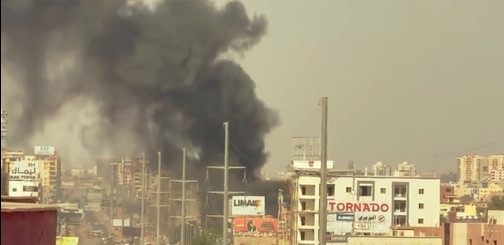Dozens killed in Omdurman battles, airstrikes increase in Sudan capital

Black smoke rises over Khartoum on November 28 last year (File photo: Elmigdad Hasan)
In mutual artillery shelling by the Sudan Armed Forces (SAF) and the Rapid Support Forces (RSF) in Omdurman yesterday, 37 people were killed and 29 others wounded, while shelling and air strikes continued on cneighbourhoods in greater Khartoum.
Residents of Block 76 of El Sawra neighbourhood in northwest Omdurman told Radio Dabanga that continuous artillery shelling by the RSF has resulted in the death of about 37 people, 17 of whom were killed on the streets. 12 others were volunteers taking a first aid course. The other casualties were fatally hit in their homes.
“Intense artillery shooting by the RSF continued for a long time while warplanes and drones bombarded its sites in the neighbourhood. The communications network resumed its services after a three-week interruption,” the sources said.
In southern Khartoum, a family of seven was killed in an airstrike on El Nahda (formerly Ingaz) neighbourhood. In the centre of the city, the Byblos Bank tower was bombed, damaging its infrastructure. Several houses in Burri, El Jereif Gharb, El Ta’if, and Arkoweet in Khartoum, and in Sharg El Nil in Khartoum North were also damaged.
The reports of shelling followed an increase in aerial bombardments over the past three days in Khartoum by the SAF. Recent airstrikes caused more than 100 civilian casualties, and damaged and destroyed several public and private facilities across the nation’s capital.
Sudan’s Emergency Lawyers accused the SAF and the RSF in a statement on Wednesday evening of “continuing to violate international humanitarian law” by carrying out air and artillery attacks targeting civilians and infrastructure, pointing out that army attacks on RSF targets in greater Khartoum “significantly increased.”
Last week, Radio Dabanga spoke with Brig Gen Kamal Ismail (Retd), head of the Retired and Arbitrarily Dismissed Officers Association, to discuss the reasons and feasibility of the ongoing military escalation.
Concerned about the aftermath of the failed Jeddah negotiations, Ismail said it led to frustration among the Sudanese and is “paving the way for new disasters.”
In an assembly session on the situation in Sudan that took place in Djibouti on Saturday, the member states of the Horn of Africa Intergovernmental Authority on Development (IGAD) agreed to redouble efforts to achieve a peaceful resolution to the ongoing war between the SAF and RSF. Hours after the communiqué was released on Saturday, the FA Ministry issued a statement denying El Burhan’s agreement to meet with Hemedti without conditions.
“The RSF seems to be negotiating from a position of strength after it is about to control all five states of Darfur,” Aisha El Basri, researcher at the Arab Center for Research and Policy Studies and former UNAMID spokesperson in Darfur, told Radio Dabanga yesterday. She warned that the IGAD summit may be the last chance for peaceful negotiations.











 and then
and then